We use cookies and other technologies to personalize your experience and collect analytics.
Things I saw at night Frida Orupabo
Frida OrupaboThings I saw at night
25 March – 20 May 2023
Modern Art is pleased to announce an exhibition of new work by Frida Orupabo. This is her first solo exhibition with Modern Art.
Frida Orupabo’s works are, in some sense, solutions to problems; the problems being that certain images do not exist and need to be created. Working mainly with collage, but also spanning sculpture and video, Orupabo’s work synthesises fragments of bodies to reconstruct narratives and imagine new configurations of subjectivity denied by colonial legacies.
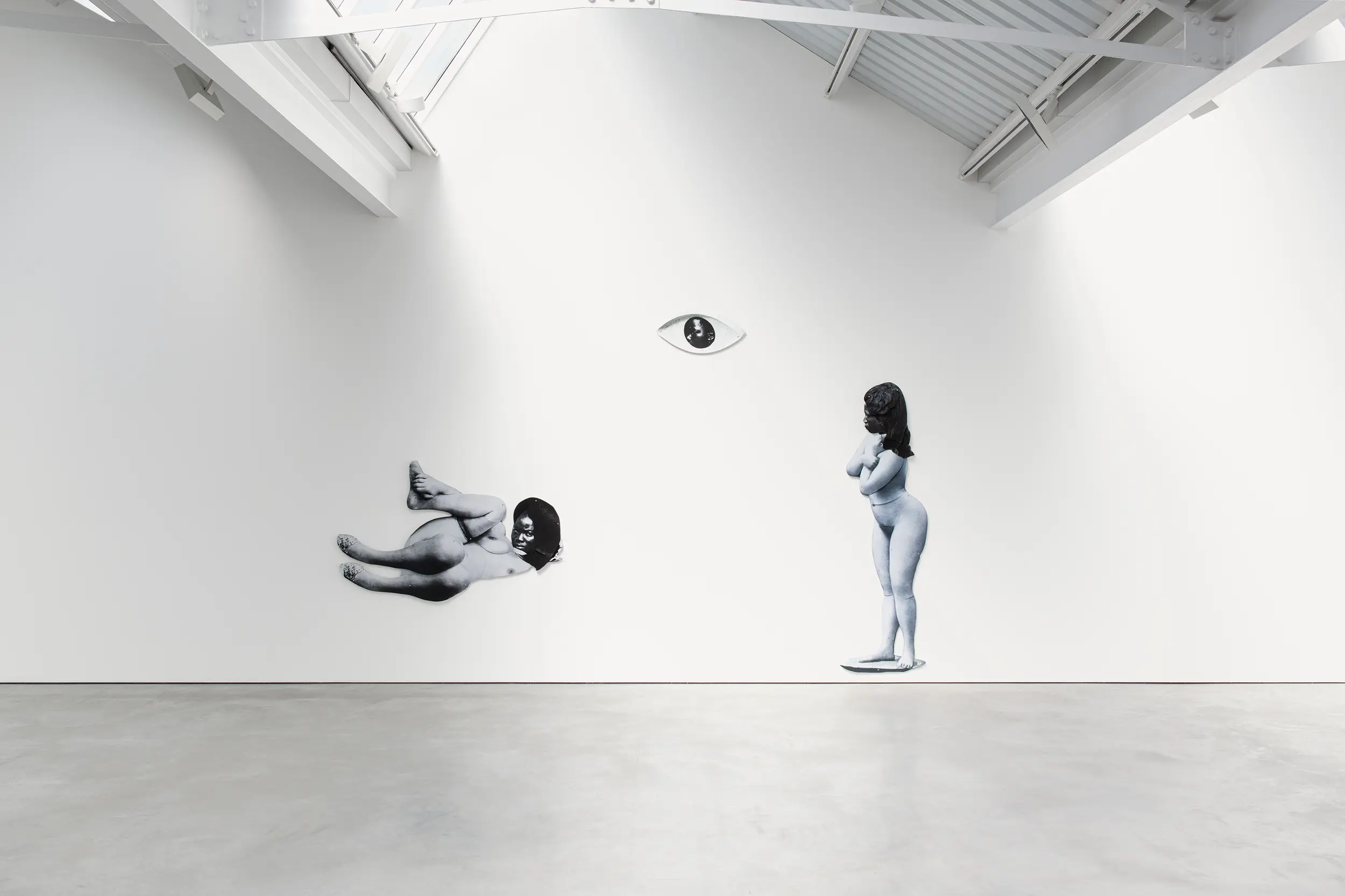
Born in Norway of dual Norwegian and Nigerian heritage, Orupabo began making collages in her early twenties as a means to work through her own complex relationship to home and identity. Later, Orupabo studied sociology and worked as a social worker, and began to publish her archive of collected and reconstructed images on Instagram. Her account, @nemiepeba, began anonymously and quietly as a collection of working images for a small audience, but soon grew in its following. Since her inclusion in Arthur Jafa’s exhibition at the Serpentine Gallery in 2017, Orupabo has exhibited widely internationally.
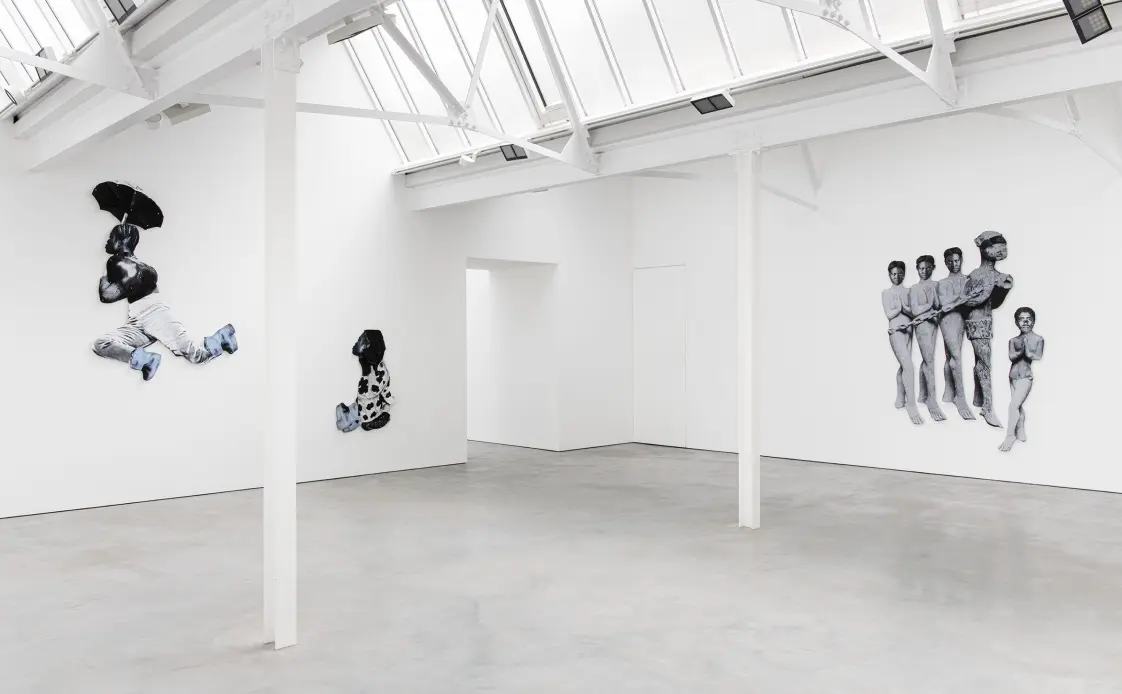
More often than not, the figures in Orupabo’s images are Black women, although the categorisation of gender, race and family heritage are not only questioned; they become the locus of her explorations. Mining digital archives mostly online, Orupabo’s process starts on a small-scale, collaging images on screen, but these often grow into much bigger, life-sized characters in the room. Enlarged, printed in tiles, cut out, and then pinned together, Orupabo’s process of combining images retains a hand-made simplicity, which carries within it a sense of possibility for play, experimentation and spontaneity. This liveliness is joined by a depth of difficult emotion held in her subjects – rage, sadness, or desolation, for instance — whose faces stare back, as though to challenge their viewers to a duel. Orupabo’s exhibition at Modern Art contains several new and recent wall-based collages, but also includes video work and sculpture, bringing together the multiple facets of her practice and elucidating her ways of thinking through making.
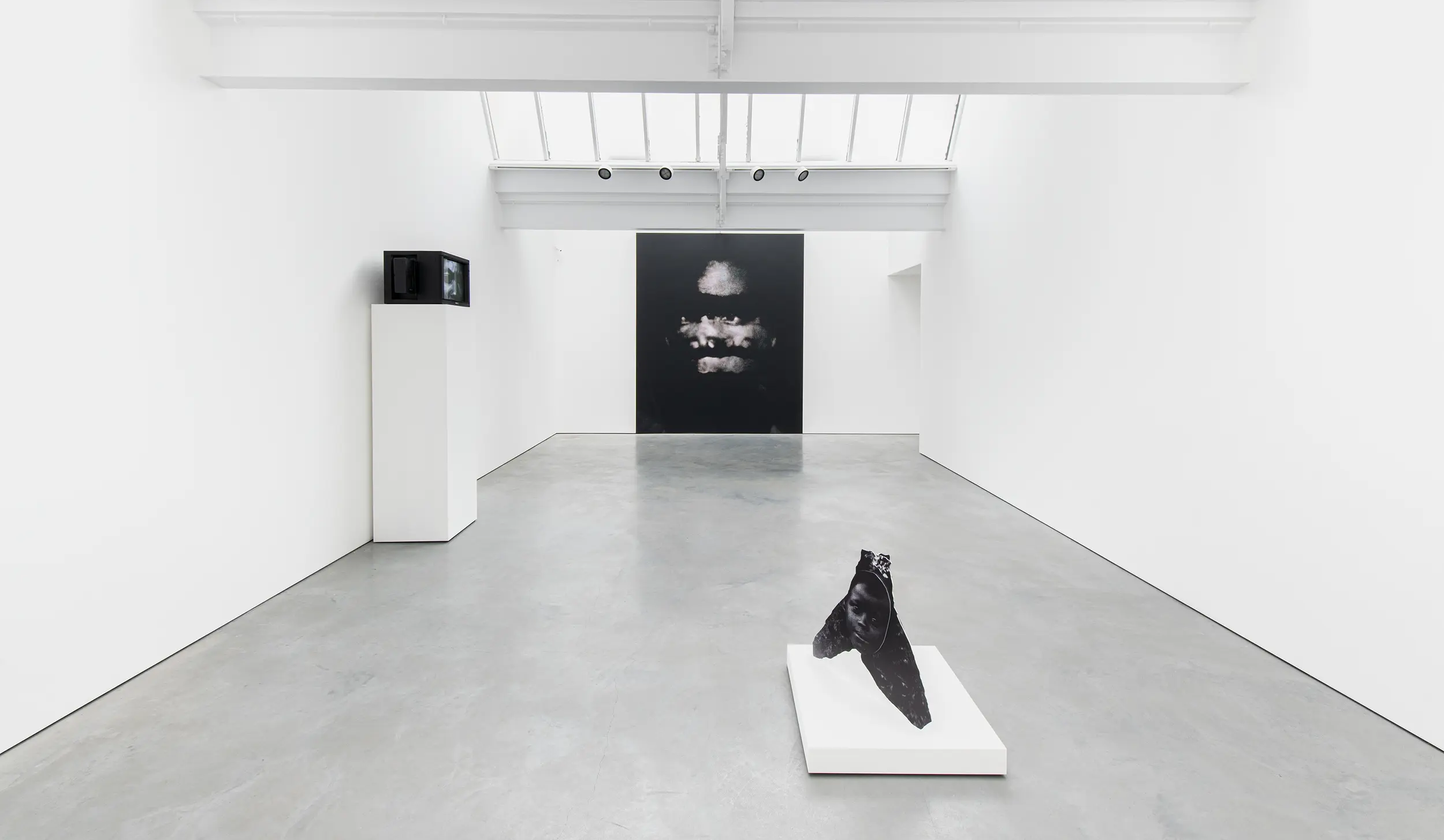
Collage is the medium that resembles my mind the most: bits and pieces from everywhere, put together to make up a new whole. I think the choice of making collages came very naturally because of the absence I felt growing up and even today. The images I was looking for didn’t – and often still don’t – exist, so the only alternative was to make them by cutting away, adding, and manipulating. It is the best medium for what I want to do.
It’s also an effective way of questioning and recreating narratives and identities; combining images that originally were not meant to stand together. To take apart, leave out and bring together. I think of it as something liberating, something very closely linked to creating and sustaining one’s own self. The layering [of the collages] speaks to complexities and contradictions, the things that make us human.
– Frida Orupabo, 2023
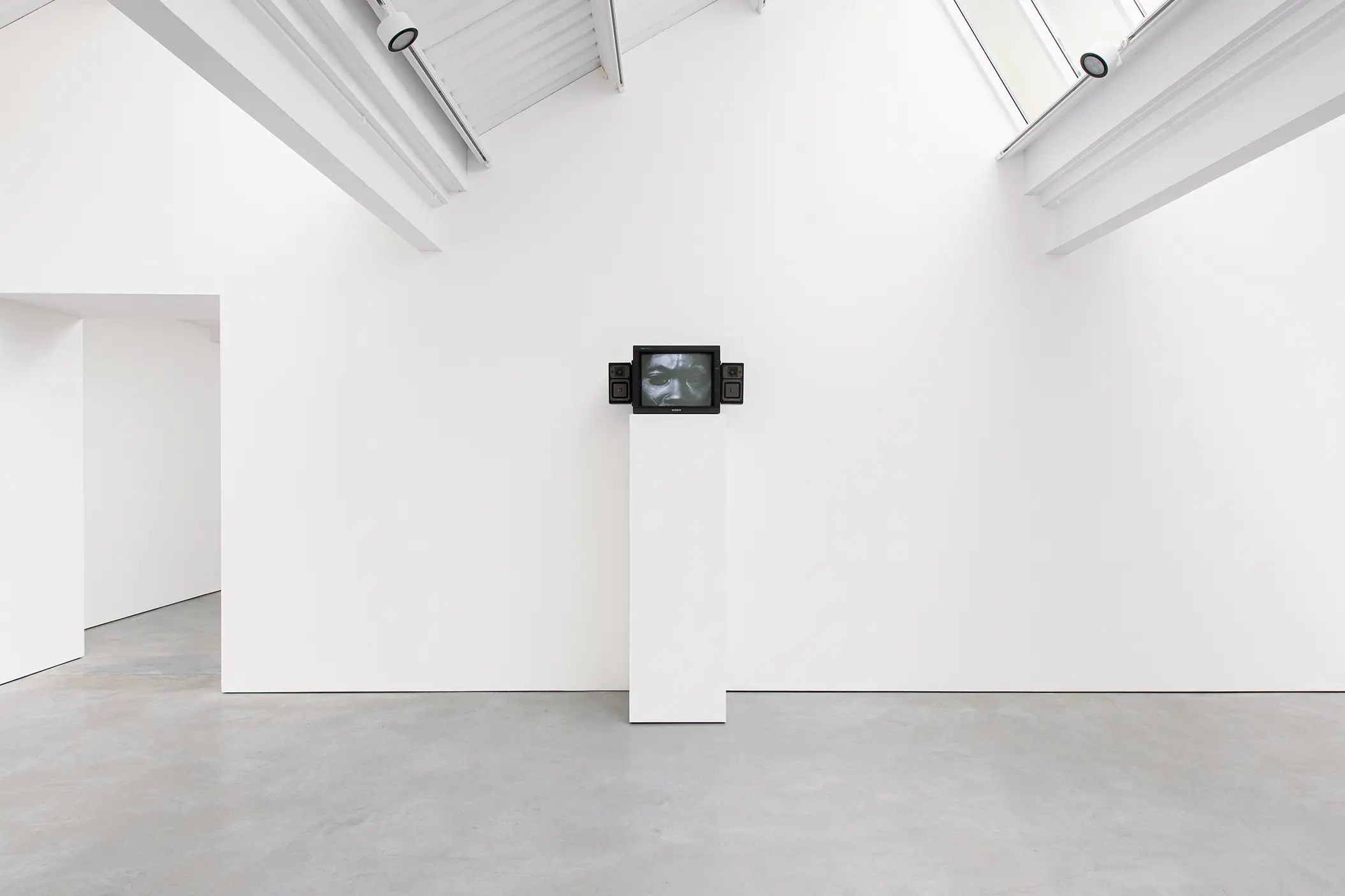
Press Release
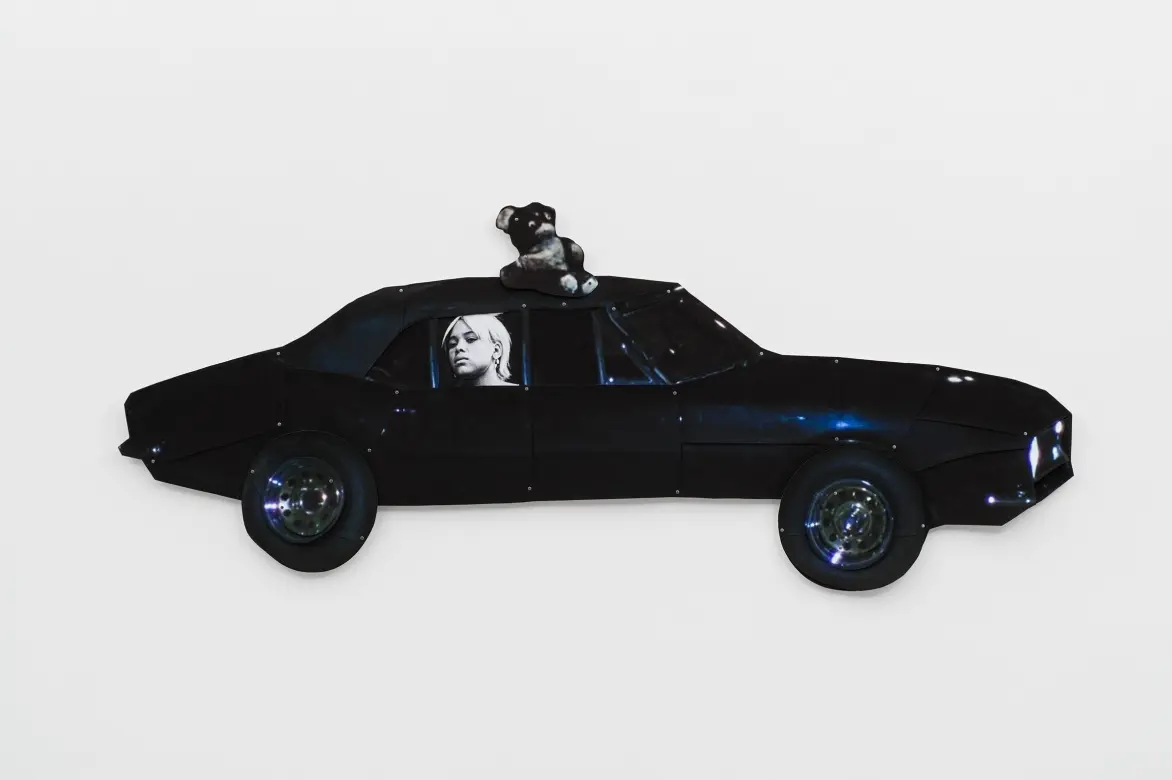
Modern Art is pleased to announce an exhibition of new work by Frida Orupabo. This is her first solo exhibition with Modern Art.
Frida Orupabo’s works are, in some sense, solutions to problems; the problems being that certain images do not exist and need to be created. Working mainly with collage, but also spanning sculpture and video, Orupabo’s work synthesises fragments of bodies to reconstruct narratives and imagine new configurations of subjectivity denied by colonial legacies. More often than not, the figures in Orupabo’s images are Black women, although the categorisation of gender, race and family heritage are not only questioned; they become the locus of her explorations. Mining digital archives mostly online, Orupabo’s process starts on a small-scale, collaging images on screen, but these often grow into much bigger, life-sized characters in the room. Enlarged, printed in tiles, cut out, and then pinned together, Orupabo’s process of combining images retains a hand-made simplicity, which carries within it a sense of possibility for play, experimentation and spontaneity. This liveliness is joined by a depth of difficult emotion held in her subjects – rage, sadness, or desolation, for instance — whose faces stare back, as though to challenge their viewers to a duel. Orupabo’s exhibition at Modern Art contains several new and recent wall-based collages, but also includes video work and sculpture, bringing together the multiple facets of her practice and elucidating her ways of thinking through making.
Born in Norway of dual Norwegian and Nigerian heritage, Orupabo began making collages in her early twenties as a means to work through her own complex relationship to home and identity. Later, Orupabo studied sociology and worked as a social worker, and began to publish her archive of collected and reconstructed images on Instagram. Her account, @nemiepeba, began anonymously and quietly as a collection of working images for a small audience, but soon grew in its following. Since her inclusion in Arthur Jafa’s exhibition at the Serpentine Gallery in 2017, Orupabo has exhibited widely internationally.
Frida Orupabo was born in 1986 in Sarpsborg and lives and works in Oslo. Selected solo exhibitions include Nicola Vassell Gallery, New York, ny, usa (2022); Fotomuseum Winterthur, Switzerland (2022); Kunsthall Trondheim, Norway (2021); Hours After, Stevenson, Johannesurg, South Africa (2020); Medicine for a Nightmare, Kunstnernes Hus, Oslo; The Mouth and the Truth, Portikus, Frankfurt am Main, Germany (2019); and A House is a House, Galerie Nordenhake, Berlin, Germany (2019). Selected group exhibitions include Kiasma Finnish National Gallery, Oslo, Norway (2022); Hasselblad Foundation, Gothenburg, Sweden (2021); Stevenson, Cape Town, South Africa (2021); Huis Marseille, Amsterdam, the Netherlands (2020); Moderna Museet, Stockholm, Sweden (2019), Serpentine Gallery, London (2017). She has participated in the Munch Triennial, Munchmuseet, Oslo, Norway (2022); 34th Bienal de São Paulo, Fundação Bienal, São Paulo, Brazil (2021); and the 58th International Art Exhibition, Biennale Arte, Venice, Italy (2019).
For more information, please contact Sam Talbot (sam@sam-talbot.com) or Pascale de Graaf (pascale@modernart.net)
Frida Orupabo